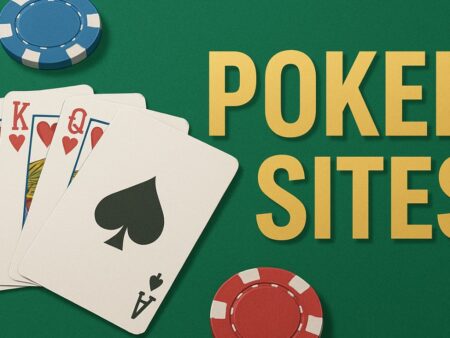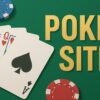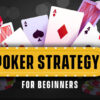Mastering Poker Strategy: Essential Tips for Every Player
Playing Poker ain’t a story of luck! It is rather a game of skill, strategy, and understanding your opponent’s psychology. Whether you’re a beginner or a pro player, understanding and applying basic poker strategies is necessary if you want to improve your game and increase your chances of winning. Knowing when to fold, bluff, or bet can heavily impact your success at the table. In this blog we’ve discussed five essential poker strategies that will guide you and help you enhance your chances of winning more in a game.
Five Key Poker Strategies
To help you get ahead in your poker journey, we’ve identified five key poker strategies that every player should master. These are –
Bankroll Management: Having knowledge of your finances is important. It helps you understand how to manage your money effectively.
Game Selection: Select and play the right games that match the level of your skills and experience at the time you play.
Positional Awareness: When at the table, use everything to your advantage, all that is within your control. Take every advantage you can get.
Bluffing Techniques: Know when and how to bluff.
Observation Skills: Read your opponents and understand their gaming pattern.
Here is a closer look at each of these poker strategies and an explanation of how they work in a poker game –
Poker Strategy 1 – Bankroll Management (Always play within your means)
One of the most important strategies in a poker game is the Bankroll Management; managing your finances. It’s very necessary to set a budget for how much you’re willing to spend on poker. Consider losing and make sure you never bet more than you can afford to lose.
Set a Budget: Fix a certain amount that you would be okay to lose. Once you know losing a certain amount won’t hurt your pocket, it becomes easy to navigate through. It will help you prevent emotional decisions and protects you from unbearable financial losses.
Track Your Spending: Keep a record of your wins and losses. This will help you understand your spendings and spending patterns. Once you understand those, you can make necessary adjustments accordingly.
Separate Poker Funds: Keep your poker money separate from your other finances. You don’t want to go broke over a game and can avoid unnecessary financial stress.
Poker Strategy 2 -Game Selection (you have to choose wisely)
What must be understood is that not all games of poker are the same and some of them may actually be more favorable for you than others. Understand where your strengths lay.
It is important that one is able to choose the right game that is to be played in line with their level of competency.
Understand the Odds: Familiarize yourself with the various types of poker games, along with their respective odds. Understand which is more favorable for you. Certain games like Texas Hold’em may be better prospects than the other.
Skill vs. Luck: Focus on games where skill plays a more significant role than luck. You train and learn skills, not luck. This increases the chances of success and you can guarantee your win by practicing regularly.
Avoid High-Risk Games: Stay away from games that rely purely on luck, as these can potentially vanish your bankroll.
Poker Strategy 3 -Positional Awareness (playing smart to avoid mishaps)
Position in poker is one of the strongest tools that you can benefit from if only you know how to utilize it right. Knowing when you need to do something and how best to do it depending on the position that you are in is a poker strategy that will help you clinch more victories.
Early Position: Be cautious. When you are one of the first to act, you have less information about other players’ state.
Late Position: This is the most advantageous position, as you can observe other players’ actions before making your move.
Adjust Your Strategy: Make sure you change how you play depending on your position to make sure you are stronger and can defeat the opponent.
Poker Strategy 4 -Bluffing Techniques (you have to learn this art of deception)
Bluffing is an essential part of poker, but it requires finesse and timing. This is possibly the most important aspect of poker strategy where understanding when to bluff and how to do it right can either make or break your play.
Timing is Key: Bluffing too often can make you predictable. Choose your moments wisely, and ensure that your bluffs are believable.
Understand Your Opponents: Bluffing is more effective against certain types of players. Identify who is likely to fold and who might call your bluff.
Mixed Strategies: Combine your bluffs with solid hands to keep your opponents guessing.
Poker Strategy 5 -Observation Skills (It is paramount to read your opponents)
Poker is as much about reading your opponents as it is about playing your cards. Developing strong observation skills can give you the upper hand.
Watch for Tells: Look for physical or behavioral clues that may reveal the strength of your opponents’ hands.
Study Betting Patterns: Pay attention to how your opponents bet. Consistent patterns can often indicate strong or weak hands.
Adapt and React: Use the information you gather to adjust your strategy in real-time, responding effectively to your opponents’ moves.
Encouragement for Beginners (Practice will make you perfect)
Starting out in poker can feel a bit daunting, especially when trying to integrate these new poker strategies into your gameplay. Nevertheless, it is worth mentioning the fact that there are certain ways and means in which your gameplay can be improved progressively with time and consistent efforts.
For beginners, mastering these skills and making them a part of your strategies might seem a bit overwhelming at first. However with consistent practice and dedication you can significantly improve your game.
It is highly advisable to start with a small bankroll so that when you are applying these strategies, you are not under immense pressure of risking a lot of money. If the person is more experienced and confident the person can start going for high rollers and become more aggressive in the game. It is very important to remember that poker is not a game where you focus on winning a particular hand and there are always lessons to be learned after each game.
By employing and mastering these poker strategies, your winning probability goes higher, hence enhancing the fun. These tips will make for a good starting point especially if you’re planning on the hobby being a lifelong one all the way up to the professional level. So you want to be a poker champion? Learn the process and understand the dedication it takes and in due time your lane will be set and profitable.

















